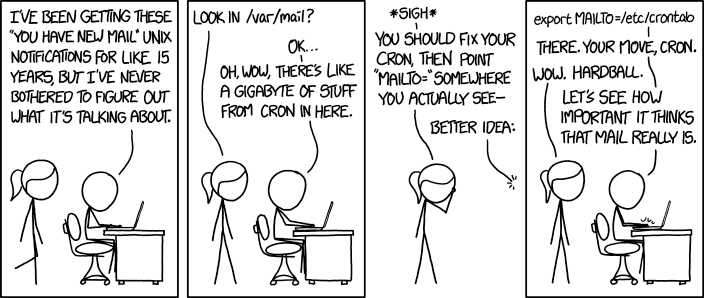Cron Mail

Take THAT, piece of 1980s-era infrastructure I've inexplicably maintained on my systems for 15 years despite never really learning how it works.

Take THAT, piece of 1980s-era infrastructure I've inexplicably maintained on my systems for 15 years despite never really learning how it works.
On Unix-like systems, cron is a system utility that runs tasks on a schedule. This program has been around since the early days of Unix and has not changed much - it is still one of the most widely used functions in modern operating systems. Many administrative tasks on servers are automated using cron, including monitoring and updates.
When a cron job produces output, cron's default behavior is to send an email to the user account under which the job ran. However, in most situations, an email address has not been set up for that user, so the email is instead written to a mailbox file. Most Unix shells will notify the user with a message like "You have new mail" when this mailbox file is updated, but if the user doesn't know how to check this mail file, they will likely just ignore the message.
In this case, Cueball has been ignoring his mailbox for fifteen years. When he finally learns where to look, he discovers more than a gigabyte worth of messages from the cron program, the vast majority of which are likely meaningless. Ponytail says to Cueball "fix your cron" (likely meaning he should fix the task that's generating the output so that it doesn't do so), then set a parameter that tells cron to send email to an address he actually checks. (He could also opt to direct the mails to
/dev/null, which would discard them, or simply disable the mail in the crontab.) Cueball, however, interprets the tremendous amount of email as spam and decides to redirect the emails to/etc/crontab, the main configuration file that contains all of cron's scheduling information. He apparently believes that this will either stop the emails or cause cron to spam itself instead.In reality, this will not cause significant problems as the
MAILTOenvironmental variable in cron takes an email address or usernames on the local system and attempts to send emails to them. It will not write or append output to a local file like/etc/crontab. Thus when cron attempts to email/etc/crontabthe mail program cron uses will generate an error saying it can't find the user/etc/crontab.For example, if you create the following crontab:
MAILTO=/etc/crontab * * * * * echo "Some output from a cronjob"installed on a user named
meon a system calledmycomputerthen you will see a new error messages email to you (located in/var/mail/me) stating it can't send email to a user named/etc/crontaband the undelivered email is being returned to the sender. The error email will look like the following:From MAILER-DAEMON Tue Sep 6 14:47:01 2016 Return-Path: <> X-Original-To: me@mycomputer.local Delivered-To: me@mycomputer.local Received: by mycomputer.local (Postfix) id 5341C64EE516; Tue, 6 Sep 2016 14:47:01 -0400 (EDT) Date: Tue, 6 Sep 2016 14:47:01 -0400 (EDT) From: MAILER-DAEMON@mycomputer.local (Mail Delivery System) Subject: Undelivered Mail Returned to Sender To: me@mycomputer.local Auto-Submitted: auto-replied MIME-Version: 1.0 Content-Type: multipart/report; report-type=delivery-status; boundary="33AF864EE514.1473187621/mycomputer.local" Message-Id: <20160906184701.5341C64EE516@mycomputer.local> This is a MIME-encapsulated message. --33AF864EE514.1473187621/mycomputer.local Content-Description: Notification Content-Type: text/plain; charset=us-ascii This is the mail system at host mycomputer.local. I'm sorry to have to inform you that your message could not be delivered to one or more recipients. It's attached below. For further assistance, please send mail to postmaster. If you do so, please include this problem report. You can delete your own text from the attached returned message. The mail system </etc/crontab@mycomputer.local> (expanded from </etc/crontab>): unknown user: "/etc/crontab" --33AF864EE514.1473187621/mycomputer.local Content-Description: Delivery report Content-Type: message/delivery-status Reporting-MTA: dns; mycomputer.local X-Postfix-Queue-ID: 33AF864EE514 X-Postfix-Sender: rfc822; me@mycomputer.local Arrival-Date: Tue, 6 Sep 2016 14:47:00 -0400 (EDT) Final-Recipient: rfc822; /etc/crontab@mycomputer.local Original-Recipient: rfc822; /etc/crontab Action: failed Status: 5.1.1 Diagnostic-Code: X-Postfix; unknown user: "/etc/crontab" --33AF864EE514.1473187621/mycomputer.local Content-Description: Undelivered Message Content-Type: message/rfc822 Return-Path: <me@mycomputer.local> Received: by mycomputer.local (Postfix, from userid 501) id 33AF864EE514; Tue, 6 Sep 2016 14:47:00 -0400 (EDT) From: me@mycomputer.local (Cron Daemon) To: /etc/crontab@mycomputer.local Subject: Cron <me@mycomputer> echo "Some output from a cronjob" X-Cron-Env: <MAILTO=/etc/crontab> X-Cron-Env: <SHELL=/bin/sh> X-Cron-Env: <PATH=/usr/bin:/bin> X-Cron-Env: <LOGNAME=me> X-Cron-Env: <USER=me> X-Cron-Env: <HOME=/Users/me> Message-Id: <20160906184701.33AF864EE514@mycomputer.local> Date: Tue, 6 Sep 2016 14:47:00 -0400 (EDT) Some output from a cronjob --33AF864EE514.1473187621/mycomputer.local--
The title text shows that Cueball is somewhat aware of what cron does, including the fact that it's existed pretty much unchanged for several decades, but he hasn't bothered to really get into understanding it, treating it more as a foe to vanquish rather than as a tool to understand and use.